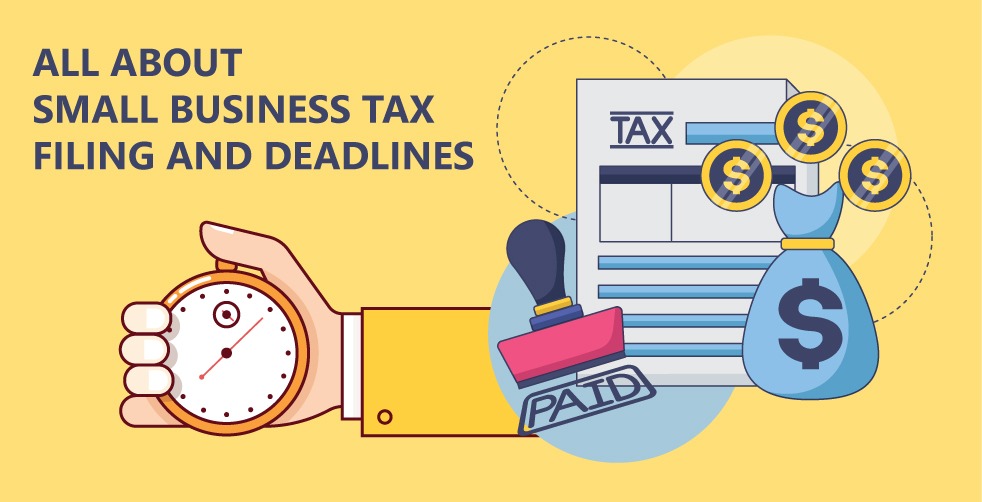All About Small Business Tax Filing
To help make the filing process less stressful, We have provided some important tax deadlines and information about Small Business Tax Filing the 2020 tax return, and more.
Here’s what you need to know for filing your 2020 tax return in Canada.

Should I file my tax return?
If you want to claim the GST, HST credit , or Canada Child Benefit, the net income declared on your tax return determines the amount you receive.
Filing a return will help you to claim:
- Provincial tax benefits
- Tax refunds for installment or source deductions
- Refundable medical expense supplement
- Canada Pension Plan or Employment Insurance (EI) premium overpayments
Individual tax deadline
The tax filing deadline for your personal tax return is April 30th, 2021.
Incorporated business tax deadline
Corporate tax returns are due 6 months after the corporation’s fiscal year-end. If your business is incorporated and has a balance that it still needs to pay, you have until 2 months after the end of your fiscal tax year to pay it off.
In some cases, there are exceptions. Canadian-controlled private corporations with annual business income less than $500,000 may have up to 3 months instead of 2 if they are eligible in a specific way. If you owe money to the CRA and file your taxes late, you’ll have to pay a penalty of 5% of the balance owed plus 1% for each month you are late, to a maximum of 12 months. If you did not file your tax for multiple years, the penalty can increase to 10% plus 2% for each month your return is late, to a maximum of 20 months.
Is there any change that may effect my 2020 tax return?
Several COVID-related programs were introduced this year to help small business owners.
Canada Emergency Business Account Loan
The Canada Emergency Business Account provides up to $40,000 in interest-free loans to small businesses. If you’re facing a decline in revenue, this loan will help you cover operating costs like rent or payroll. The best part is, the loan is interest-free until December 31st, 2022. Business Tax Filing And up to $10,000 of the loan could be forgiven if you repay it by then. It is easy to apply for a loan through your bank or credit union that holds your primary business operating account.
The government also recently expanded the Canada Emergency Business Account Business Tax Filing. This expansion would enable businesses eligible for CEBA loans, which continue to be seriously impacted by the pandemic, to access an interest-free loan of up to $20,000, in addition to the original CEBA loan of $40,000. So the total would be $60,000 of which $30,000 ends up forgivable if repaid by December 31, 2022.
Farm Credit Canada Funding
If you’re facing cash flow issues or feeling the impact of lost sales, this loan will help Business Tax Filing. This loan will help you run your business without any other tension of operating costs. If you’re gearing up for harvest season, you can use the loan to purchase inventory or equipment. Contact Farm Credit Canada to find out what your options are. This benefit is available through the EI program and will provide up to 4 weeks of income support while you’re on training without your regular paycheque.
Canada Emergency Wage Subsidy
This program is for keeping your employees on payroll. The taxable benefit provides up to 75% wage subsidy to a qualifying business. The amount of the subsidy depends on how much the business revenue has dropped. Business Tax Filing The money can be used to prevent layoffs and make it easier to resume operations after the pandemic is over. Usually, salaries are usually the biggest cost on an income statement. Under this program, you will have some cash flow that you can use for operating costs like rent, utilities, insurance, and property taxes.
The government recently announced that Canada’s Emergency Wage Subsidy has been extended to June 2021.
When are my RRSP contributions due?
You have until March 1, 2021, to contribute to your Registered Retirement Savings Plan (RRSP). The most appealing feature of the RRSP is that it lowers your income tax bill. Each year you have a set amount of contribution room. For 2020, the RRSP deduction limit is 18% of a taxpayer’s pre-tax earned income, or $27,230 (whichever is less).
What can I save in tax as a small business owner?
There are several tax deductions available to you, which will help you bring down your tax bill. Top deductions for business owners include:
- Advertising expenses
- Business-use-of-home expenses
- Meals and entertainment
- Office expenses
- Vehicle expenses
For more details about tax filing and getting support in your next tax return, contact finnection via email at info@finnection.ca or call us at (647) 795-5462
Disclaimer: This material is for educational and awareness purposes only. For most of the content in this document, terms and conditions would apply. It is advised to refer to the CRA website or a competent tax/accounting professional before applying any content in a specific situation. Finnection Inc. is not responsible for any unintended consequence as a result of utilizing this information without formal consultation with us.
